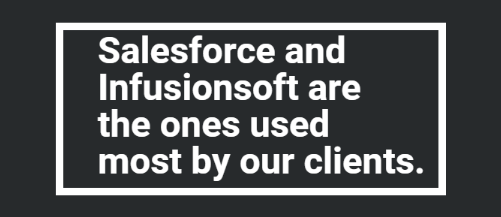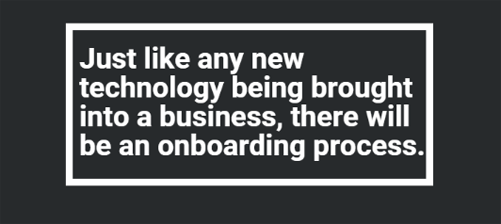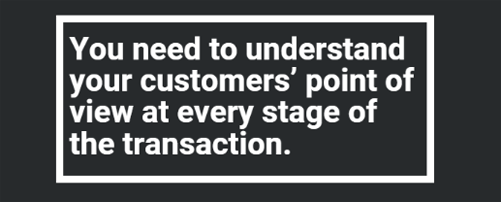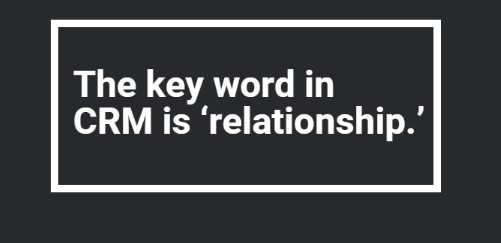Retail CRM Tactics from the Pros

Do retailers really need a customer relationship management system? Are their ecommerce platforms and point-of-sale systems enough?
These are just two of the questions presented to a panel of experts who share their insights into managing customer relationships in retail. They provide their guidance for retailers looking to navigate the customer relationship management (CRM) waters below:
Do retailers need a CRM?
-4-1-1-1.png?width=100&height=100&name=500x500-R_Shapiro178(LI)-4-1-1-1.png) "Retailers need to track the customers' history to know if the customer is using the site for the first time or it's a loyal and long-term purchaser. They then need to tailor their follow-up communications and make it personalized to the specific customer's purchase; welcoming new customers and rewarding or extending appreciation to repeat patrons."
"Retailers need to track the customers' history to know if the customer is using the site for the first time or it's a loyal and long-term purchaser. They then need to tailor their follow-up communications and make it personalized to the specific customer's purchase; welcoming new customers and rewarding or extending appreciation to repeat patrons."
- Richard Shapiro, Founder and President of The Center For Client Retention (TCFCR)
 "CRMs, whether a part of a POS or separate, enable retailers to determine their most valuable customers. With this in hand, retailers can tailor specific marketing campaigns to these customers that incentivize them to become repeat shoppers and spend more. Furthermore, a properly used CRM can manage new customers as well as those who aren't in that top value tier. The point being, to nurture them overtime to turn them into more valuable customers, and hopefully advocates for your business."
"CRMs, whether a part of a POS or separate, enable retailers to determine their most valuable customers. With this in hand, retailers can tailor specific marketing campaigns to these customers that incentivize them to become repeat shoppers and spend more. Furthermore, a properly used CRM can manage new customers as well as those who aren't in that top value tier. The point being, to nurture them overtime to turn them into more valuable customers, and hopefully advocates for your business."
- Justin Guinn, Market Research Associate at Software Advice
 "I would turn this question around and ask, 'Is it more expensive to get new customers, or to bring back existing customers?'
"I would turn this question around and ask, 'Is it more expensive to get new customers, or to bring back existing customers?'
We all know the best ROI is found by trying to bring back previous customers. In today's marketing ecosystem, having data on your customers gives you a huge advantage. If all you had was their email, you could create custom audiences on Twitter and Facebook to reach them where they spend their time.
Even more important though, is if used properly the CRM can help you build relationships with your customers. It allows you to track purchase behavior, segment your customers into segments - e.g. High Revenue, Average Revenue and Low Revenue customer segments - and even potentially give you better insights into merchandising.
One thing many companies confuse, is CRM and marketing automation & analytics. Many of the solutions provide a suite of products that are complementary, and may include a CRM, email automation, segmentation and even analytics. Whether a company wants all of those things in one product, is really something that needs to be determined based off business needs, existing solutions in place and especially budget."
- Bryant Garvin, Chief Marketing Evangelist at Bryant Garvin Consulting
 "Yes, in manner of speaking. If a brand wants to effectively understand and motivate their customers to interact with the brand and make purchases, they need a system to centralize their cross-channel data while synthesizing the information specific to each individual consumer. As consumers continue to interact with brands on an increasing number of channels including social and mobile, traditional CRMs, that are essentially a digital sales rolodex and opportunity tracker, are becoming increasingly outdated. Traditional CRM systems are not designed to handle the complex consumer data integrations and information structures related to customer behavior, trends, tendencies and preferences, and therefore cannot efficiently produce insights that provide clear and complete picture of how consumers engage with a brand."
"Yes, in manner of speaking. If a brand wants to effectively understand and motivate their customers to interact with the brand and make purchases, they need a system to centralize their cross-channel data while synthesizing the information specific to each individual consumer. As consumers continue to interact with brands on an increasing number of channels including social and mobile, traditional CRMs, that are essentially a digital sales rolodex and opportunity tracker, are becoming increasingly outdated. Traditional CRM systems are not designed to handle the complex consumer data integrations and information structures related to customer behavior, trends, tendencies and preferences, and therefore cannot efficiently produce insights that provide clear and complete picture of how consumers engage with a brand."
- Brad Mag, Chief Operating Officer at Clutch
 "In today's fast-paced life, every retailer, online and offline definitely needs a CRM. The reason is because of the insane amount of advertising noise in the marketplace today. This is the amount of marketing messages each person sees every day, which is only increasing. A good CRM will help stay top of mind, as well as manage the relationship on an automated basis."
"In today's fast-paced life, every retailer, online and offline definitely needs a CRM. The reason is because of the insane amount of advertising noise in the marketplace today. This is the amount of marketing messages each person sees every day, which is only increasing. A good CRM will help stay top of mind, as well as manage the relationship on an automated basis."
- Michael Maven of Carter & Kingsley
 "A CRM platform can be a useful tool for retailers particularly when integrated within their website and content management strategies. Retail marketing is increasingly becoming a 1:1 interaction. With the increasing complexity of retail sales funnels and the focus of custom content tailored to the user, it is becoming increasingly important for all retailers to track the interactions with their customer."
"A CRM platform can be a useful tool for retailers particularly when integrated within their website and content management strategies. Retail marketing is increasingly becoming a 1:1 interaction. With the increasing complexity of retail sales funnels and the focus of custom content tailored to the user, it is becoming increasingly important for all retailers to track the interactions with their customer."
- Brian Copening, Executive Vice President of RYP Marketing
What CRM would you suggest for ecommerce businesses and why?
 "Without favoring one CRM over another, retailers would do well to look for a solution that allows them to not only collect customer data, but also make notes: What kinds of purchases did the customer buy? What do you know about their demographic make-up? How frequently do they come in? This kind of information can be collected and can be used to help tailor any number of outreach strategies that lets the customer know how much you appreciate their business-even if it's been a while since they've stopped in."
"Without favoring one CRM over another, retailers would do well to look for a solution that allows them to not only collect customer data, but also make notes: What kinds of purchases did the customer buy? What do you know about their demographic make-up? How frequently do they come in? This kind of information can be collected and can be used to help tailor any number of outreach strategies that lets the customer know how much you appreciate their business-even if it's been a while since they've stopped in."
- Tami Cohorst, COO of Abtek
"There are many great options out there for retailers. Some providers have options focused on the retail market with strong offerings tailored to a retailer's specific needs. Salesforce offers a robust package with tools specifically for retailers that can be integrated into any size retail environment.
"There are also many POS Systems that provide CRM functions where sales associates can add customer contact data for future product updates and can link email receipts to a retailers social media profiles. Shopkeep is a cloud based POS system that is based on a tablet that provides this type of functionality.
There are many options out there and the decision over which one fits your business will greatly depend on your strategy for integrating CRM into your specific business model. It is most important to consider how your CRM integrates across multiple platforms and social networks. Can you integrate web, mobile, and social media platforms into one cohesive strategy that automates the communication process and provide cross platform metrics to ensure you are communicating with your customers one the platform the use most."
- Brian Copening, RYP Marketing
"Like many answers when it comes to technology...it depends. For enterprise businesses, it could very well be worth using an enterprise solution like Oracle CRM on Demand or Salesforce combined with an ERP on the backend. For small to medium businesses, potentially tapping into Intuit's QuickBase - which many companies already use QuickBooks - or something like Agile CRM which has a CRM solution built specifically for retailers could be ideal. One thing which many retailers will like about Agile CRM is it's simple integration with popular shopping platforms like Shopify & Magento.
- Bryant Garvin, Bryant Garvin Consulting
"Salesforce and Infusionsoft are the ones used most by our clients. They both have highly customizable options and have modular features if you need your CRM to do something extra and more advanced than a standard solution would be able to provide."
- Michael Maven, Carter & Kingsley

"To genuinely gain a 360-degree, cross-channel view of customers, ecommerce businesses need the next step beyond CRM, a platform with technology designed specifically to help marketers understand available customer intelligence and address engagement challenges. Consumer Management platforms offer cross-channel data synthesis and deep customer understanding, that allow brands to create motivating personalized engagements with comprehensive measurement and optimization. It's a complete platform engineered specifically to help marketers gain a clear understanding of the consumer, and then deliver upon these preferences to build relationships, increase brand loyalty, and improve sales."
- Brad Mag, Clutch
What modern challenges do CRMs overcome for retail businesses?
"The CRM system needs to be simple so associates can quickly learn to use its capabilities and be able to recall a customer's history efficiently. Customers hate when your company purges their history after a short period of time and they need to provide their shipping information again. You are telling the customer 'You are no longer a customer.'"
- Richard Shapiro, TCFCR
"One of the challenges traditional retailers have faced is how to link a brick-and-mortar store to a customer doing research about their products on the Web. By tracking buying and research habits by customer through CRM retailers can better blur the line between the physical store location and their Web presence.
This helps a retailer become a source for quality content and information about their products and services. Becoming this type of resource to you customers will help increase return and referral customers as well as allowing retailers to increase up-sell opportunities."
- Brian Copening, RYP Marketing
"One of the biggest complaints I hear from retailers is they are frustrated they constantly have to be forking out money to companies like Google, just to get customers - who already shop with them - back to their websites. While a CRM can't completely eliminate the need for good paid search and SEO campaigns, it can help you own the relationship with the customer more fully. If you don't know who your customers are, or how to connect with them, you are going to be forced to pay someone else to bring them back to you, at a higher cost than you really want."
- Bryant Garvin, Bryant Garvin Consulting
"Mostly follow up on an automated basis, as well as action-based communications to make a customer feel as if they are receiving a highly personalized service. If a customer feels they are being personally taking care of it can help to build a relationship with them, but a CRM will do it on an automated 'hands-free' basis."
- Michael Maven, Carter & Kingsley
What new challenges does a CRM present for a retailer?
"The biggest challenge is integrating the CRM into your overall marketing plan. It can't simply be a place to gather customer data. In order to properly gain the benefits of direct CRM for retail customers retailers will need to create a 1:1 marketing plan that is focused on specific buyer personas and delivers content tailored. This is a very different approach to retail marketing of the past where information was pushed out to mass audiences and customers were acquired using a volume approach. Using CRM for retail now makes the marketing process individual with each customer seeking their own information about your product from multiple channels across multiple devices. A retailers marketing plan now mus take this shift into account to ensure an effective integration of CRM into the retail model."
- Brian Copening, RYP Marketing
"Just like any new technology being brought into a business, there will be an onboarding process. How long this process takes to get the CRM up and running depends on many factors including previous experience and ease of use of the chosen system. Aside from the onboarding process, it may take retailers some time to build a solid business plan around their new CRM. It's one thing to learn about and understand the capabilities afforded by these systems, but it's an entirely different task to leverage these in driving increased sales and customer retention. The good news is that these days, POS software vendors are making it as easy as possible for retailers to get their CRM functionality up and running."
- Justin Guinn, Software Advice

"Many retailers may find that they are short on time-and certainly investing time and energy into maintaining accurate data in a CRM can be challenging, but the pay-off for doing so can definitely contribute to the growth of the business."
- Tami Cohorst, Abtek
"The biggest challenge a CRM will present for retailers is the need to be and stay organized. Retailers may need to hire someone specifically to manage the CRM and relationship type of marketing that this can enable.
Something a lot of companies don't think about is how the CRM could potentially change longstanding practices, like discounting to specific audience segments. A CRM can expose strengths and weaknesses of a business when implemented and used correctly. Some companies may have a hard time stomaching the weak spots that a CRM can highlight for them."
- Bryant Garvin, Bryant Garvin Consulting
"You need to understand your customers' point of view at every stage of the transaction. This can be tough for someone who is not used to doing this, and has been in 'sell only mode' forever. But this is the new way of doing business in 2015. If you don't do it soon, you'll be left behind."
- Michael Maven, Carter & Kingsley

"Traditional CRMs systems that were built to manage sales contacts create tremendous challenges for marketers given their rigid structures and the cobbled approach to add cursory marketing functionality. Countless marketers have struggled to retrofit the sales contact structure of a traditional CRM to capture and manage customer data and intelligence, let alone deploy and measure customer engagements. The gaiting, complex sales-focused design is frustrating for marketers to operate.
It is important to understand that CRM systems are only as useful as their ability to gather and synthesize information on the numerous ways consumer interact with brands. As technology improves and consumers find new ways to engage with brands, the challenge for retailers using CRM systems is ensuring that they are aware of the nuances of customer engagements. The ability to analyze engagement behavior, trends, tendencies and preferences is critical in order for marketers to continually understand the consumer and the new channels being used."
- Brad Mag, Clutch
Anything else you'd like to add about CRMs for retailers?
"The key word in CRM is 'relationship.' Machines can't build relationships; only people can. It's still up to the company to train their front associates to be welcoming, engaging and show customers they matter whether it's a physical store or commerce site."
- Richard Shapiro, TCFCR

"Using CRM for retail is only as good as the marketing plan an internal processes that support the overall system. If quality best practices are put in place to ensure accurate data entry, consistent follow up and effective messaging are taking place then retailers can use CRM to help improve their bottom line and increase individual interaction with the customers."
- Brian Copening, RYP Marketing
"Depending on the number of locations and number of customers, a full-fledged CRM may be too aggressive for small to medium retailers. Often times, the CRM capabilities of today's top POS systems offer everything these businesses need to better understand their customers and leverage that understanding to increase revenue."
- Justin Guinn, Software Advice
"Just like any capital investment in your business - and purchasing a CRM solution is a capital investment - you need to approach the decision with care. It could very well be worth the time and money to hire a consultant to help evaluate and make sure that you are getting exactly what you want.
You don't know, what you don't know, and in selecting a CRM for your company, what you don't know could cause you a lot of headaches, lost time and money."
- Bryant Garvin, Bryant Garvin Consulting
"Not having a CRM is extremely irresponsible in today's economy. If you don't have one yet, you're surely missing out on a lot of extra revenue, which can go very far toward your bottom line.
Simply following up with customers who don't buy is a huge revenue source for many of our clients who are not aware of this new way of creating profits in a business."
- Michael Maven, Carter & Kingsley
"In today's 'Age of the Customer', real-time information access on products and pricing has made customer loyalty a diminishing asset for many brands. As more and more information becomes available to consumers and to the frequency they receive products specifically tailored to their preferences increases, retailers must deploy next-gen marketing solutions in order to deliver personalized engagements that motivate the individual by earning trust, driving loyalty and building brand evangelism."
- Brad Mag, Clutch
Agree? Disagree? Sound off in the comments section below.







